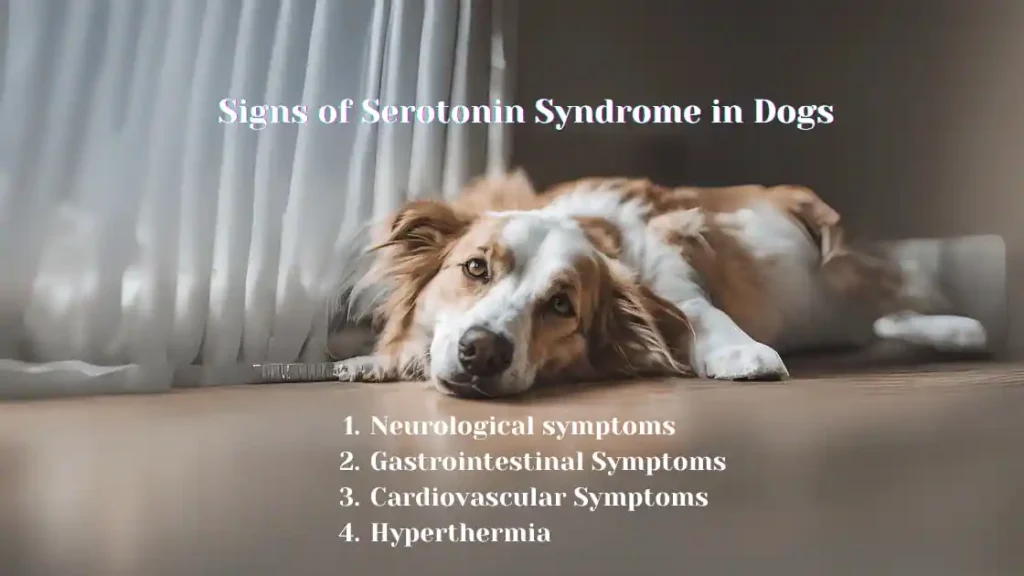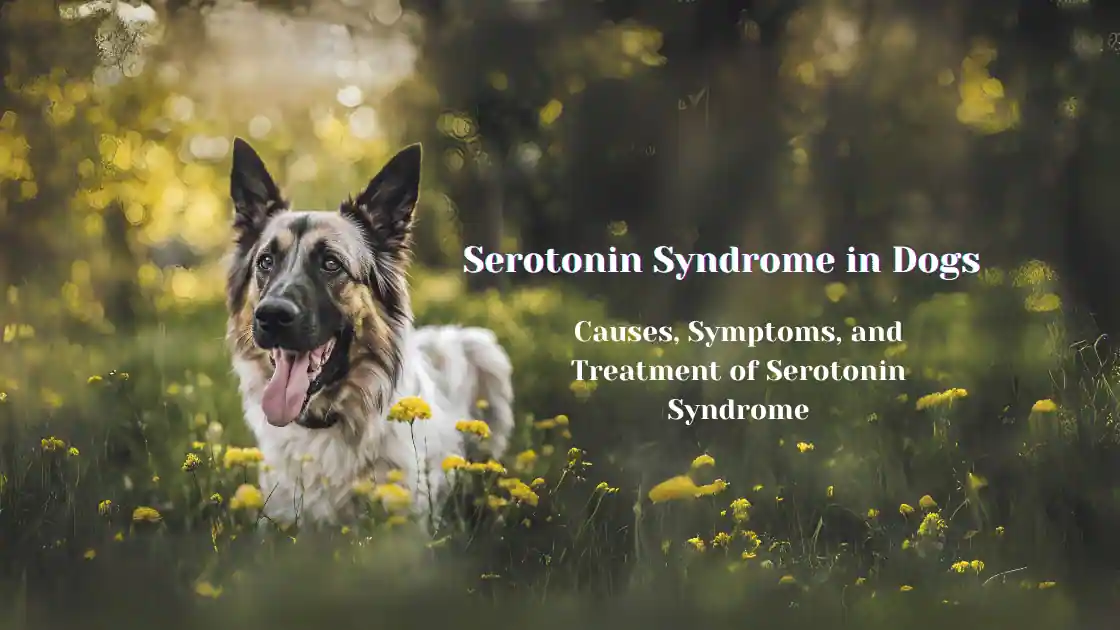Causes, Symptoms, and Treatment of Serotonin Syndrome
Serotonin syndrome in dogs is a rare but potentially life-threatening condition if left unnoticed or untreated. It occurs when a dog’s serotonin levels become too high, typically due to certain medications or toxins. Though serotonin is a crucial neurotransmitter plays role in mood, sleep, appetite, pain, GI function, and other body functions. Understanding serotonin syndrome is very important both for pet owners and veterinarians to ensure accurate diagnosis and treatment. This blog post provides insight into the intricacies of serotonin syndrome in dogs, including its causes, symptoms, treatments, and preventative measures.
What is Serotonin Syndrome in Dogs
Serotonin is a neurotransmitter that plays an important role in regulating mood, appetite, sleep, and other essential functions in dogs like humans. Serotonin syndrome, defined as a group of clinical signs associated with high serotonin levels due to administration of serotonin-altering medications.
When a dog experiences serotonin syndrome, the serotonin levels rise to abnormal levels, leading to serious and sometimes fatal symptoms. Serotonin syndrome is usually triggered by exposure to overdose of medications, combinations of medications or toxins that affect serotonin levels.
What is Serotonin?
Serotonin, also known as 5-hydroxytryptamine (5-HT), is a chemical that relays signals between nerve cells. It plays a major role in various physiological processes, including regulating mood, digestion, and sleep. In dogs, serotonin helps in maintaining overall well-being, but when levels surge uncontrollably, it can result in serotonin syndrome.
Causes of Serotonin Syndrome?
Serotonin syndrome typically occurs when a dog is exposed to medications or substances that increase serotonin levels, leading to overstimulation of the central and peripheral nervous systems. The primary causes of serotonin syndrome in dogs include:
1. Medication Overdose
The most common cause of serotonin syndrome is exposure to medications that enhance serotonin activity. These medications include:
- Selective Serotonin Reuptake Inhibitors (SSRIs): Commonly used for treating behavioral issues in dogs such as anxiety or aggression. Examples include fluoxetine and sertraline.
- Tricyclic Antidepressants (TCAs): These medications can also lead to serotonin syndrome if overdosed or improperly combined with other drugs like SSRIs. Examples include amitriptyline and clomipramine.
- Monoamine Oxidase Inhibitors (MAOIs): Used in treating canine cognitive dysfunction, MAOIs like selegiline can interact with other serotonin-increasing drugs, leading to serotonin syndrome.
- Opioids and Pain Medications: Some opioids, such as tramadol or fentanyl, affect serotonin levels and can contribute to serotonin toxicity if used in combination with other drugs increasing serotonin levels.
2. Drug Interactions
One of the primary triggers of serotonin syndrome in dogs is the interaction between multiple medications. For example, combining SSRIs with TCAs, MAOIs, serotonin-norepinephrine reuptake inhibitors (SNRIs), dextromethorphan, certain antibiotics, such as linezolid and fluoxetine or opioids can lead to serotonin overload, even if each drug is administered in normal therapeutic doses.
3. Accidental Ingestion
In some cases, dogs may accidentally ingest medications/ drugs intended for human use, such as antidepressants or recreational drugs like MDMA (ecstasy). Even a small dose of these substances can induce serotonin syndrome in dogs.
Mechanisms of Serotonin Syndrome
The exact mechanism of serotonin syndrome is complex but involves:
- Increased serotonin release: The medications or substances stimulate the release of more serotonin from nerve cells.
- Blocked serotonin reuptake: These agents prevent the reabsorption of serotonin, leading to further accumulation in the synapse.
- Overactivation of serotonin receptors: Excessive serotonin binds to receptors in the brain and other organs, causing a variety of symptoms.
Signs & Symptoms of Serotonin Syndrome in Dogs
Recognizing the signs of serotonin syndrome in dogs is crucial for prompt intervention. Symptoms typically occur within 30 minutes to several hours after exposure to the substance. Symptoms can vary depending on the severity of the condition, but they often include:
- Neurological Symptoms
- Agitation and Restlessness: Dogs may appear anxious, pace around, agitation, or exhibit signs of discomfort, altered mental status.
- Tremors and Muscle Rigidity: Muscle twitching (myoclonus), hyperreflexia, tremors, and stiffness are common in affected dogs.
- Seizures: In severe cases, serotonin syndrome can trigger seizures, which require immediate medical attention.
- Ataxia (Loss of Coordination): Dogs may stumble or appear uncoordinated in their movements.
- Gastrointestinal Symptoms
- Vomiting and Diarrhea: Gastrointestinal distress is common in dogs with serotonin syndrome.
- Hypersalivation: Excessive drooling may occur.
- Cardiovascular Symptoms
- Increased Heart Rate (Tachycardia): A rapid heart rate is a common sign of serotonin syndrome.
- High Blood Pressure (Hypertension): Elevated blood pressure can result from excess serotonin.
- Hyperthermia
- Elevated Body Temperature: Dogs with serotonin syndrome often develop hyperthermia, or abnormally high body temperature, which can cause organ damage if left untreated.

Diagnosing Serotonin Syndrome in Dogs
There is no single test that can definitively diagnose serotonin syndrome. Diagnosis is primarily based on the dog’s or cat’s medical history, clinical signs, and recent exposure to medications that affect serotonin levels. Veterinarians may perform blood work and other diagnostic tests to rule out other potential causes of the symptoms.
Veterinarians will typically ask about:
- Recent medication usage.
- Any potential exposure to toxins or drugs.
- Previous history of similar symptoms.
Treatment and Management of Serotonin Syndrome in Dogs
Slow introduction of additional behaviour modification drugs at lower doses is recommended. Serotonin syndrome is a medical emergency that requires immediate veterinary care. The primary goals of treatment are to stabilize the dog, reduce serotonin levels, and manage symptoms.
1. Discontinuation of Serotonin-Enhancing Drugs
The first step in treating serotonin syndrome is stopping the administration of any medications that may be altering serotonin levels or contributing to the condition. Sedatives like Trazodone, dexmedetomidine, alprazolam, acepromazine etc. can also alter the serotonin levels.
2. Symptomatic and Supportive Care
Veterinarians will typically focus on treating the specific symptoms that the dog is experiencing. This may include:
- Intravenous (IV) Fluids: To prevent dehydration and support organ function.
- Cooling Measures: Hyperthermia is treated with cooling techniques such as cold-water baths or fans.
- Muscle Relaxants or Sedatives: To manage muscle rigidity, tremors, or seizures, sedatives like diazepam or midazolam may be administered.
- Anti-Seizure Medications: If seizures occur, medications like phenobarbital or diazepam can be used to control them.
- Antiemetics: To alleviate nausea and vomiting. In case of recent ingestion vomiting can be induced and activated charcoal can be given.
3. Serotonin Antagonists
In severe cases, veterinarians may administer serotonin antagonists to block the effects of excess serotonin. One such drug is cyproheptadine, an antihistamine that can also reduce serotonin activity. Chlorpromazine is another antagonist that can be used for management of serotonin syndrome.
Prognosis of Serotonin Syndrome
The prognosis for serotonin syndrome in dogs largely depends on how quickly treatment is initiated and the severity of the condition. With early intervention, most dogs recover fully within 24 to 72 hours. However, severe cases or delayed treatment can result in long-term complications or even death.
Preventing Serotonin Syndrome in Dogs
While serotonin syndrome cannot always be predicted, there are measures that can be taken to minimize the risk. Some preventative strategies include:
- Careful Medication Management: Always follow your veterinarian’s dosage instructions when administering medications. Never adjust dosages or add new medications without consulting your vet.
- Avoiding Drug Interactions: Be mindful of potential drug interactions, especially when your dog is prescribed multiple medications. Consult your vet before combining any medications.
- Securing Medications: Keep all medications, both for humans and pets, in secure locations where your dog cannot access them.
- Use of Alternative Medication: For pain, anxiety or other behavioural issues medications that do not affect serotonin levels can be used like α2 agonists, benzodiazepines and gabapentin.
Common FAQs on Serotonin Syndrome in Dogs
1. Can a dog develop serotonin syndrome from a single dose of medication?
Yes, a dog can develop serotonin syndrome after a single dose of certain medications, especially if the dose is too high, dog is already sensitive for that drug or if the medication interacts with other drugs.
2. How long does it take for symptoms of serotonin syndrome to appear in dogs?
Symptoms can appear within 30 minutes to a few hours after exposure to a serotonin-enhancing substance. Immediate veterinary attention is crucial if you notice any signs.
3. Is serotonin syndrome always fatal in dogs?
No, serotonin syndrome is not always fatal. With prompt veterinary care, most dogs recover fully. However, severe or untreated cases can be life-threatening.
4. How can I prevent serotonin syndrome if my dog is on medication?
To prevent serotonin syndrome, always follow your veterinarian’s instructions carefully, avoid combining medications without consultation, and monitor your dog for any unusual symptoms.
5. What should I do if I suspect my dog has serotonin syndrome?
If you suspect your dog has serotonin syndrome, seek immediate veterinary care. Do not attempt to treat the condition at home, as it can rapidly worsen.
6. How long does serotonin syndrome last in dogs?
The duration of serotonin syndrome can vary depending on the severity of the condition and the effectiveness of treatment. Symptoms may resolve within a few days, but some effects may linger.
7. Can serotonin syndrome cause long-term effects in dogs?
In some cases, serotonin syndrome can lead to long-term effects, such as muscle weakness, cognitive impairment, or heart problems. However, these are relatively rare.
Conclusion
Serotonin syndrome in dogs or cats is a serious medical condition that requires immediate action and veterinary intervention. Pet owners should be aware of the potential risks of serotonin-enhancing medications like SSRIs, TCAs, MAOIs, Trazodone, Tramadol, SNRIs, dextromethorphan etc. as well as the signs and symptoms of serotonin toxicity in dogs. By understanding the causes, treatment options, and preventative strategies for serotonin syndrome, you can help ensure the health and safety of your beloved pet. Always consult your veterinarian for guidance on medication management and any concerns you have regarding your dog’s health.
Disclaimer: This post has been written after reviewing available literature and utmost care has been taken. It is intended for vets and evaluation of pet’s condition is necessary before starting tramadol. Self-medication of your pet without consulting your veterinarian can be life threatening for your pet.






Pingback: Tramadol Hydrochloride for Dogs and Cats – The Veterinary Medicine
Pingback: Trazodone Hydrochloride for Dogs and Cats – The Veterinary Medicine